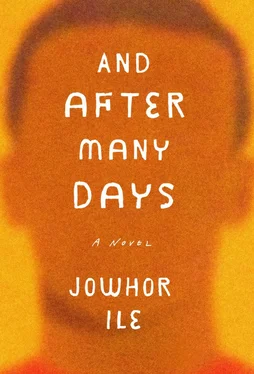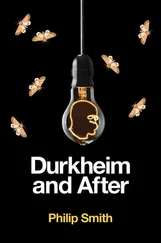That past September, the house had been full of visitors and sympathizers, people offering help, saying, No, it can’t be, there must be something we can do. By October the number of visitors had trickled down. Mr. Ifenwa still came around as often as before, but he and Bendic would sit in the parlor, and you wouldn’t hear them talk or laugh like before. Paul’s friend Fola came around every day. In the early days after Paul disappeared, he told Ajie not to worry; he patted his shoulder, “He’s going to come back.” There was even a sense of excitement in Fola’s voice as he said this to Ajie, as though this were one of those mystery stories they read where, finally, at the close of the book, the mystery is solved and all the loose ends tied up in the most satisfying ways. With nothing else to talk about apart from Paul’s disappearance, Fola dropped in less and less.
When misfortune befalls you, people secretly blame you. Ajie noticed this. People can’t help it. They do it so they can believe it won’t happen to them. They haven’t done whatever it is you have done to deserve such suffering. They see you on the street and look away, and if they can’t avoid meeting you, they talk about other things. It’s as if you are a tainted thing, someone who could possibly bring bad luck.
A few weeks after Paul went missing, the story eventually went stale among their neighbors. Fola passed his SAT and got a place at a university in Oklahoma. Before he left, he came over to see Ajie. He showed him the university brochure, which featured pictures of students sitting outside on the lawn, dressed in jeans and T-shirts, laughing, drinking juice, looking in books. He said he would write to Ajie once he got to Oklahoma.
On this Friday morning, Ajie and Bendic are huddled over the JVC radio in the parlor. BBC World Service isn’t clear enough. “Try Voice of America,” Bendic suggests.
The nine Ogoni activists who were detained for over a year by the military government were recently tried, and a few days prior, the Provisional Ruling Council announced it had approved their execution. The news sent everyone reeling. It wasn’t possible; that wasn’t even a trial. Earlier that day Ajie overheard Bendic saying to Ma that there was no way the activists were going to be executed. “The international community will whisk them out!” Ajie imagined a secret operation led by some foreign commandos stealing into the prison cells and evacuating the activists, just as it happened in films. One of the men was an outspoken author and playwright who had denounced the government and the activities of the oil companies that had brought environmental damage to his community and impoverished his people. Uncle Tam knew this man well and had been to many meetings and rallies with him. The day of the scheduled execution, right after Ma, Bibi, and Auntie Julie left to see the woman of God, Bendic asked Ajie to tune in to a foreign radio station, since no local news could be reliable.
It is unusually warm in the parlor. Bendic has a wrapper around his waist; he has pulled up a seat next to the divider where the radio is. He mutters that the military dictator might be crazy, but he wouldn’t do this. They get clear reception.
It is a man’s voice coming from VOA, confirming that the men were found guilty, and all nine of them were hanged earlier that morning.
“Animal!” Bendic shouts. “Animal! Animal!” he shouts over and over again. He and Ajie are still sitting beside the radio as comments flow in from studio guests. After a while Bendic stands up, gathers his wrapper a little tighter around his waist, and then shuffles to his bedroom.
—
Ajie returned to school the next week. One Tuesday afternoon during a boring business studies lesson, he saw his guardian standing by the class door with Ma by his side. They went with Ajie to his dormitory to get his things.
Mr. Onabanjo told Ma he would speak with Ajie’s form teacher to see if his test results could be used to assess him for the term; school was shutting down for Christmas break in two weeks anyway, so he would not be missing much.
Ma didn’t say much to Ajie throughout their journey back to Port Harcourt. Ajie did not ask her any questions, either. He didn’t think they had found Paul. He was too afraid to ask if anything had happened to Bibi. He thought maybe something worse had happened in Ogibah, or maybe 11 Yakubu had burned down and they had nowhere to live.
Nothing at all made him think to ask anything about Bendic.
Finally, it is evening. The lights come on in the new high-rise shop that was built across the street, and Ajie sees that there are men sitting, drinking beer, on one of the balconies. Their loud voices and laughter reach him, and he stands up to push the window out a little. Ismaila is outside the gate, talking to a man. Ajie heard the gate rattle and thought it was Ma returning from church. He steps out and sees it isn’t Ma. It is a man dressed in a faded blue babariga. Maybe the neighbor’s gateman, Ajie thinks.
He returns inside. There is something strange about standing in the room you grew up in after you have been away from home for a very long time. To look at the bed you slept in when you were eight or thirteen and still are expected to sleep in at twenty-six.
Paul’s bed is still there by the window, and the reading table is still wooden and brown, with all the old nicks, scratches, inkblots, and dull gleams of candle wax.
Outside the window, the air darkens, and Ajie hears Ismaila laughing.
He steps outside and tells Ismaila he is going for a stroll. “No problem,” Ismaila says, “I go tell madam when she return from church.”
Ajie turns left at the lights, veering from Nzimiro. There are many more bikes on the roads than there used to be. Even in this once reserved part of town, there is a disproportionate increase. Light, handy, and fast, these bikes have a mild insouciance about them. Something playful and bad-tempered at the same time. Yesterday, stuck in traffic for about an hour on the way from the airport, Ajie left the driver in the car and hailed a bike. He hadn’t returned to Port Harcourt after five years, he said to himself, only to be trapped in the hot stickiness of a small car held up on East-West Road. He took a seat on the well-padded pillion, and when the Okada man moved the bike, he felt the rush of wind on his face, inside his shirt, and on the back of his neck. He could see Port Harcourt again, but not through a car window.
He approaches the barbershop on Ogoja Street. It seems wider than he remembers it, and full of light. He can see the mirrors, and the little generator outside trembling and puffing smoke. A boy, nearly as tall as the door, pushes the lacy blinds to one side and walks out. He pauses midstep, pats his hands over his pockets, front and back. Keys, wallet, mobile phone, what has he forgotten? He turns around and steps back into the shop.
There have been times when Ajie would turn a street corner or look into a car and see someone’s back, a profile or head that looked just like Paul’s. He understands how these things work — it’s just his mind playing tricks on him. Still, he would increase his pace, and when he got close enough to the stranger, he would stare a little bit too long.
Once, on the London Tube, he sat opposite a boy wearing dark green skinny jeans. There was a quality to this boy’s nose, his eyebrows, his boots, the way he stood up when the train stopped at Moorgate station. There was a something Paul-like about him. Ajie saw it right after the boy sat down opposite him, so he placed his eyes on him and kept them there. Their eyes met. The boy looked away, but Ajie didn’t. The train wobbled in the track and howled, and then the boy returned the stare, attempting some kind of feeble protest: What are you looking at? he seemed to ask. When the boy stood up to leave the train at Moorgate, he picked up his backpack from the ground, and Ajie saw it was the same army-green as Paul’s bag, the one he carried on that day he left the house over a decade ago, on another continent. Ajie stood up a little too late to follow the boy, and the doors beeped and slammed shut in his face.
Читать дальше












